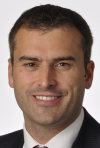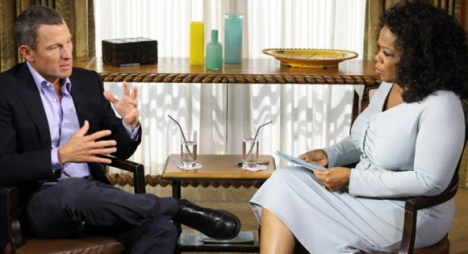Lance Armstrong’s confession: The PR verdict
 In this guest post Red Agency MD James Wright assesses drugs cheat Lance Armstromg’s PR strategy in his Oprah confessional.
In this guest post Red Agency MD James Wright assesses drugs cheat Lance Armstromg’s PR strategy in his Oprah confessional.
I was a huge fan of Lance Armstrong. Like many others I followed his career with awe, winning arguably the toughest event in the world, ‘The Tour’ seven times was incredible. I followed his interviews, read the books and supported his charity. Now, as we stand on the crest of what is probably the biggest sporting scandal of the modern era there is a feeling of betrayal.
Lance has taken a well trodden path in the crisis manual; confess to a huge TV audience, throw in a few tears, say you are sorry, talk about the pressure you were under, the cancer battle and seek forgiveness. Oprah is the biggest show in town for Americans wanting to get their confessional on and importantly, if Oprah shows understanding, even sympathy, then it gives the green light for others to do so.



wow I’ve got a bridge to sell you, would you like to buy it? I was suspicious when he won the second tour de france, 7 times yeah right! Awe? Not me, Suspicion is the word!
Surely I am not the only person that saw the smirk across his face during the interview, almost like he was proud of his cheating. Of course some people will still idolise him, it would be naive to think otherwise – and I have no doubt some brands will seek to exploit this idolisation.
Interesting article, James. Armstrong’s brand is toxic.
Will the public and the media go further and attempt what the Romans called “damnatio memoriae” – literally the damnation of the memory? Already medals have been returned and records expunged but will roads be renamed?
In our celebrity-obsessed culture, I can imagine a role for him but his brand will now always stand for very different values.
I have an Opera House I’d like to sell you. Most of my friends thought the whole cancer schtick was an excuse for him to take extended time out of sport surrounded by doctors so he could work out precisely how to get maximum benefit from performance-enhancing drugs while learning how long each substance took to clear his system so he could avoid testing positive. Not sure you’re in the right business if you feel “betrayal” at Armstrong’s actions.
Interview? It was two friends on a couch ffs.
Get Jeremy Paxman in from the UK next time. He would have conducted an interview.
On another note: Is calves blood jabs considered drugs, or doping, or what? I need to build up my leg muscles!
Really wished Lance had Jackie Mooned Oprah…
“Everyone can eat s#!t! A big bag of s#!t! I’m the greatest man in the world!”
Nice article.
I think he put forward a very controlled performance – was anyone seriously expecting anything else?
Clearly Oprah was a soft option, but to be fair she was probably less of an easy touch than many feared (although clearly wanting to get through all 112 questions meant she forgot to follow-up on areas). And you can’t blame the guy for not going on Paxman or facing Walsh or Kimmage – is anyone seriously suggesting they would choose that in his situation?
As you identified, I think his big failing was not looking like he really was sorry for all this – the occasional smirk etc giving him away. And really surprised on a couple of counts that the PR advisors didn’t give him better answers to steer the narrative:
– Why now? He let it be all about returning to competition and his ban being unfair in comparison to others. Surely there was a more sympathetic option.
– Lowest point? The calls from Livestrong. Surely he would have been better to talk about the never ending pressure on his family – the mother and son stories that he then related later.
To me this was not enough – okay in basic confession but poor in genuine contrition. He probably only has one more chance to set the story straight before we all right him off as the “arrogant prick” that he unfortunately appears to be.
” … you need to say you are sorry and seek forgiveness.” ” … road to redemption … .”
I’m finding the judgmental tone of a lot of the coverage of Armstrong a bit over the top. Almost fundamentalist.
Just a bike race cheat. Meanwhile the weekend streets of Melbourne run with the blood of the alcohol-soaked and drug-addled. Makes Armstrong look like the biblical scapegoat.
“Finally, you need to say you are sorry and seek forgiveness.”
If he had just ONCE (and preferably more frequently) looked directly into the camera and said “I’m sorry. I stuffed up and I let you all down”, I _may_ have believed him.
“But…….” and that was the most insidious word he used throughout both episodes. He continues to justify his actions with “But…..”. Never once did he truly accept his wrong doing – rather he looked like he was more upset he got caught.
But I had cancer…..
But everyone was doing it (bar the “heroes” as he called them)
But, but, but……. but in truth I couldn’t watch it without thinking, “You’re still lying….. and you’ll continue to do so.”
Interesting to see the SMH poll on should he be forgiven has gone from 80/20 against to 50/50 today…. obviously the PR’s working!
Armstrong’s book should read: Armstrong, a Compulsive Liar
I just searched in the Livestrong site for Lance Armstrong and got this…”We’re sorry, but no results matched your search. Please search again.” Not a wordc to the people he set this foundation up for. His Facebook page? last entry is Jan 9th and a link to him being interviewed by Oprah. Twitter? Nothing since Jan 7th.
So for someone seeking forgiveness he’s done a pretty poor job reconnecting with his audience. In fact, he’s done nothing at all.
Did he handle this well James? Deeds not words.
You don’t get it. Brand Armstrong is dead. Brand Armstrong is about winning by strength in adversity, Cyclist Armstrong has been shown to be about winning by cheating, bullying and corruption. That inevitably changes the meaning of Brand Armstrong to something which no product in its right mind will want to be associated with.
The “stick to what you did wrong” advice might be good PR. But it’s poor advice in this circumstance. There have been so many lies said that the only way viewers can measure Lance’s contrition is by what he does, not by what he says. By not naming names he came across as not meaning what he said.
You also ignore the subtext here. That Cyclist Armstrong isn’t just not a nice person, but there’s something almost pathological about him. The interview did nothing to dispel that subtext, rather the lack of emotion in the rehearsed responses were confirmation.
Oprah didn’t help any here, her lack of knowledge didn’t meant she couldn’t ask cut-through follow-up questions based on Lance’s answers. I also thought that Oprah did a poor job explaining that Lance wasn’t merely cheating. Oprah also let Lance get away with some blatant PR moves (such as calling people to apologise just so he could say in the interview that he’d called people to apologise).
The problem with a formulaic PR response, like Armstrong’s, is that most people – particularly those who sponsored him, use the same playbook.
If he had thrown out the book he might have been able to change some views, but by sticking so closely to the accepted script he just emphasized that he was a cheat & liar – even if he was honest about his confession.
There is no simple way out for Armstrong – indeed there may be no way out. However why should there be?
Lance to write a new book: I didn’t have the balls to come clean
Armstrong is dead as a Dodo.
I’m sorry but any credibility this article could have had was lost at the first point, where you have him a tick for coming completely clean. Anyone who knows anything about cycle sport (or who has bothered to read the evidence in the Usada report or the listened to a cyclist other than Armstrong) will know the chances of him having come ‘completely clean’ are close to zero (ref his claim about riding his 2 comeback Tours clean).
Secondly, the point about pointing the finger at others, the only way for him to redeem any credibility in cycling IS to point the finger and explain how he got away with it for so long – and who helped him. That’s the only way he will help cycling get past the cancer he nurtured in its highest profile peloton.
Can we please have fewer ‘former fans’ and more people who actually know something about cycling write these articles?